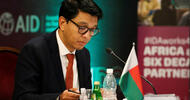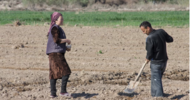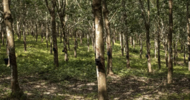The Pakistani company MCG Consulting, which had been working with Saudi Star Agricultural Development Plc on a rice farm in the Gambella Regional State, has pulled out of the project.
- The Reporter
-
23 November 2013
A controversial foreign investment to produce agrofuels for Europe on 20,000 ha in Senegal has angered communities and sparked violent clashes between peasants and the police.
- CRAFS, GRAIN, Re:Common
-
07 November 2013
A violent attack on a tea plantation leased by Indian-owned Verdanta Harvest Plc, a subsidiary of the Noida-based Lucky Group, has renewed concerns over Ethiopia’s policy of leasing out large tracts of land to international investors.
- The Hindu
-
05 November 2013
In the face of evidence, the UK and US continue to deny systematic human rights abuses are occurring in the Lower Omo as thousands are displaced for an irrigation scheme.
- Think Africa Press
-
04 November 2013
Ethiopia's huge agricultural output has brought about an economic miracle for the nation. But inhabitants are being pushed out of their native land by foreign investors and have no share in the profits.
- Journeyman Pictures
-
28 October 2013
Huge delegation lead by Ethiopian prime minister Hailemariam is on a tour at Shabelle region to inspect lands prepared for investors.
- Shekosh Report
-
18 October 2013
Anywaa Survival Organisation (ASO) recently had an opportunity to interview affected community representatives and leaders who fled their homes in Gambela and Lower Omo because of government land grabs.
- InterContinental Cry
-
17 October 2013
Flower growers in Kenya have gone on strike to protest unpaid wages from Karuturi Global, the Indian flower export multinational.
- CorpWatch
-
10 October 2013
After enabling foreign firms to grab vast stretches of land, the government has begun to review its land policy.
- Africa Intelligence
-
27 September 2013
Food companies in the North have always purchased land in the global South to produce export crops. What is different today is the unprecedented scale of these purchases and the kinds of crops that are being grown.
- Ethics & International Affairs
-
19 September 2013
A journalist's visit to South Omo, where rights groups say police have raped women and otherwise pressured locals to leave an area tagged to become a huge sugar plantation, was quickly curtailed by authorities.
Indigenous Peoples are being forced to become dependent on aid handouts having lost their land and their ability to produce their own food.
- InterContinental Cry
-
12 September 2013
In Ethiopia, some 43 firms have acquired agricultural land but scores of these have already left the sector, while 16 of them are currently under probation.
- The Reporter
-
09 September 2013
The Land Policy Initiative will host a workshop on 30 September to evaluate recommendations arising from a study by Dalberg Global Development Advisors, which has developed a high level strategy and business plan; as well as an M&E framework to guide the implementation of the African Union declaration on land.
Are the government's large-scale developments in southern Ethiopia forcing local populations to move with the times or just move out the way?
- Think Africa Press
-
21 August 2013
L'accaparement des terres comme une forme de néo-colonialisme n'est pas une question de noms et d’origines, mais simplement une question liée à l'expansion mondiale du système capitaliste.
But human rights and environmental groups say private investment has opened Africa to exploitation through land-grabs by foreigners who are exporting crops to meet food and biofuel demands.
California think tank issues double-barreled report alleging Washington, London are willfully ignoring gross violations.
Two new reports from the Oakland Institute show how Western development assistance is supporting forced evictions and massive violations of human rights in Ethiopia.
- Oakland Institute
-
17 July 2013
Indian companies have attracted global controversy for a spate of large land deals across Africa, yet the Indian Export and Import (Exim) Bank has largely steered clear of directly financing land deals.
Africa must be developed in a rush in order to avoid a global food crisis with huge changes, including a confrontation with chiefs, the role of women and the views on collective property, says Danish Minister for Development Cooperation.
Sometime within the last century, soil erosion began to exceed new soil formation. Now, nearly a third of the world’s cropland is losing topsoil faster than new soil is forming, reducing the land’s inherent fertility.
What is striking is how brazen and unapologetic the New Alliance is in its quest to open up African farmland to an unprecedented wave of industrial-scale investment.
Mozambique’s President Armando Guebuza has rebuffed allegations that land-grabbing has taken place along the Nacala Corridor under the Japanese and Brazilian-supported ProSavana agriculture project in the north of the country.
- Southern Times
-
10 June 2013
Ethiopia’s effort to resettle local farmers into main villages while also leasing land to foreign corporations or wealthy Ethiopians has put Gambella under scrutiny for charges of violent forced relocations.
The slow progress of Karuturi Global and similar projects has prompted the Ethiopian government to reassess its policy of leasing vast tracts of land to single investors.
Ethiopia’s government said it won’t cooperate with a probe into whether the World Bank violated its own policies by funding a program in which thousands of people were allegedly relocated to make way for agriculture investors.
DFID documents reveal that, despite denials of funding forced relocations, British cash pays salaries of officials implementing the Ethiopian government's 'villagisation' programme.
The Hindu's Addis Ababa correspondent Aman Sethi has recently written about Indian companies’ involvement in Ethiopia and Mali, and on 19 May he took part in a Q&A session on Facebook on the issue of so-called Indian land grabs in African countries.
- Global Voices
-
22 May 2013
Karuturi Global faces accusations of causing floods to local villages, not paying taxes, contributing to human rights violations and providing dismal working conditions at its farming operations in Gambela, Ethiopia.















